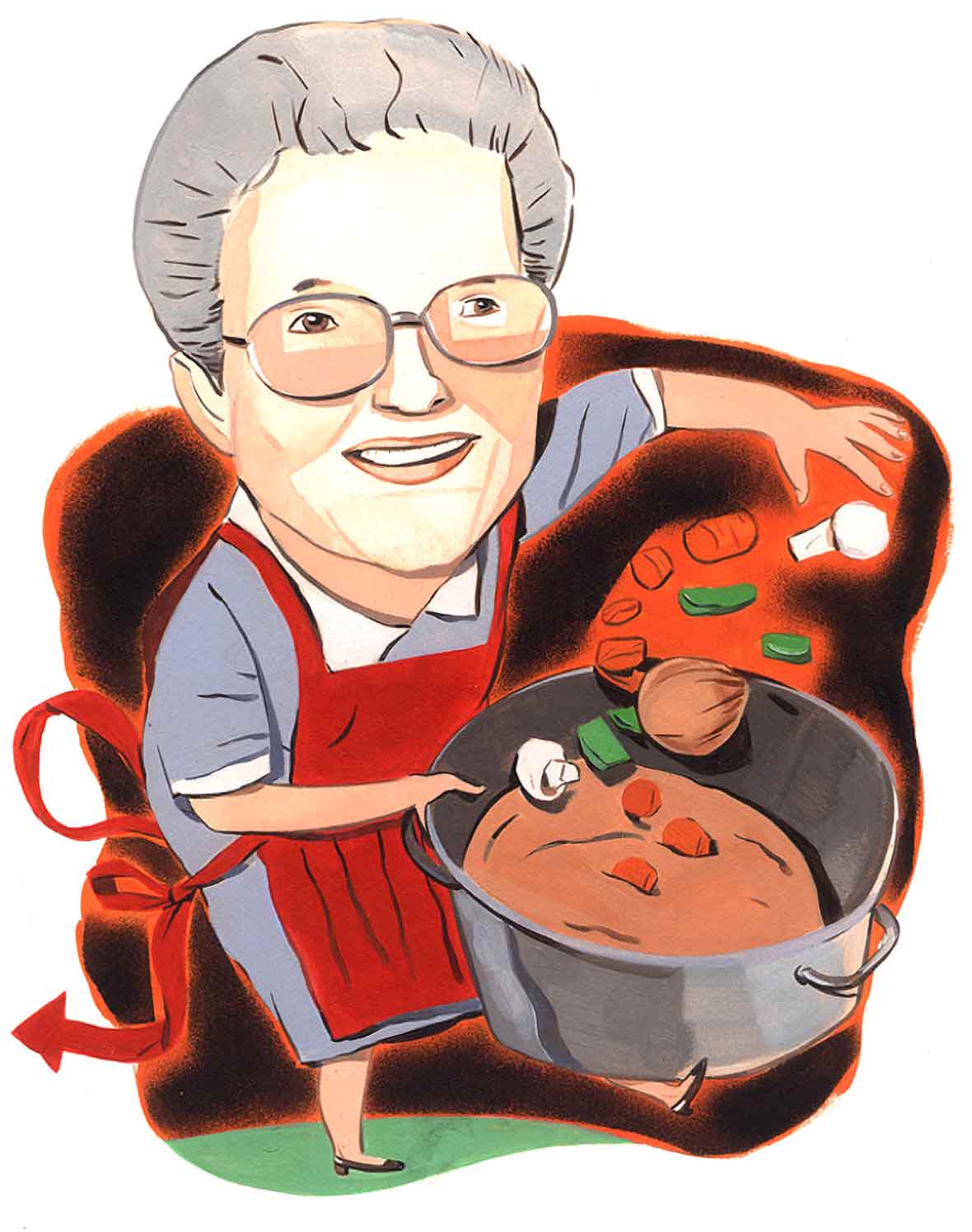
Enter my mother’s kitchen, a domain she’s ruled with benign autocracy for more than 59 years, and all physical laws and culinary edicts cease to exist there. It’s like finding yourself in the loony world of a Warner Bros. cartoon where pain is comical, time and space are elastic, and gravity acts as if it never heard of Sir Isaac Newton. For example, when making garnish for a dish, my mother will grab a gargantuan bunch of parsley and, with the ferocity of the Tasmanian Devil, buzz through it in seconds, leaving a thimble-size pile of green flecks. She is a human Ginsu knife.
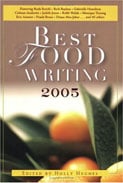
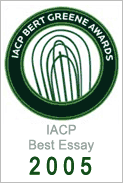
Apparently, in her kitchen, short tempers seem to cause short cooking times, too. Proof: She will fill a pot with water, dump in three fistfuls of dried fava beans, add a 10-ounce link of Portuguese sausage, called chouriço, and crank the flame to high. If she’s had a rough day, she’ll give the pot a hooded glance, and the soup is roiling in minutes. Whoever said a watched pot never boils never knew my mother.
On her “Me Days,” though—peaceful afternoons when all she has to do is write several dozen e-mails, wash and iron my father’s underwear, and reorganize the silverware drawer—she’ll go through the identical process of soup making. Yet the pot, even though set over the same heat, will only burble, never boil, no matter how long it’s been on the stove. Considering her preternatural ways in the kitchen, it’s no wonder that until the age of 12 I was terrified that I was a real-life Damien, as depicted in the film The Omen: a prepubescent possessor of dark and supernatural powers.
But despite her ample gifts at the stove, she has one of the worst batterie de cuisine in New England. Search her cupboards and cabinets, and there’s not a cookbook, measuring cup (save the one she got from Weight Watchers in 1964), or measuring spoon to be found. The one knife she does have is older than me, and every so often my father trundles to the basement, puts on his protective goggles, flicks on the rotary grinder, and files off another sixteenth of an inch in the name of sharpness.
It was into this anarchic and wacky kitchen that I walked to learn our family’s repertoire of Portuguese cuisine.
I began by pestering my mother for recipes, which proved futile because I soon discovered she didn’t cook with any. Sure, tucked away in a bedroom drawer was a green leather-bound telephone directory (circa 1958) filled with a sizable collection of recipes that she had carefully transcribed onto its gray pages—under the correct alphabetical tab, of course. But these recipes were so lackluster and ordinary, nothing like the dishes she makes nowadays, that my only recourse was to cook with her.
So there we stood, side by side, weekend after weekend: her chopping, dicing, poking, and pounding, and me frantically scooping ingredients into measuring cups or weighing them on a scale that I’d brought from home before she could elbow her way to the stove and toss it all in a big pan.
“Measuring cups are for wimps,” she warned, pointing her knife at me. Then she held out her cupped hand: “This is all you need.” I put my hand alongside hers; it was three times the size.
“But Ma,” I tried to explain, “measuring is the only way to standardize a recipe. To know exactly what you do.”
“You really want to know what I do?” she asked tenderly.
“Yes, I do,” I said. “I really do.”
“Then stand here for the next 43 years, and you’ll get the hang of it,” she said. “How do you like them bananas!” And with that, she directed her superhuman energies to sawing through five pounds of onions—all without shedding a tear.
Out of desperation, I hit upon the idea of videotaping her cooking. That way she could whiz about and improvise as much as she wished, and all I’d have to do was keep rewinding the tape until I deciphered the recipes.
And improvise she did. If a three-pound pork shoulder wasn’t available for a dish, in went a four-pound chuck roast.
“When will it be done?” I asked of the unusual substitution.
“When it’s done,” was the standard-issue answer.
If a trip to the local fishmonger for two dozen littlenecks was a bust, she’d make a quick calculation then swap out a dozen quahogs or two quarts of Ipswich clams.
“We’ll keep the extras for chowder,” she’d say, taking a deep whiff of the briny, sandy bag. “How’s that, kiddo?”
Vegetables were the worst, though. For the past 25 years, the entire family—all 66 of us—assumed long before I was baptized that the 15,000 square feet of land beyond my parents’ yard would be given to me when I turned 21, so I could build a house. That’s what you do when you’re Portuguese: cook and bequeath land. Sensing my reluctance, given that I had my heart set on New York City from the time I was 10 years old, my father commandeered the plot and turned it into one of the most astonishingly fecund gardens in the Northeast.
That meant armfuls of corn, fava beans, potatoes, cabbage, kale, tomatoes, onions, squash, and carrots were added to my mother’s nightly improv. So what if her carne assada (roast beef) calls for potatoes? The carrots were perfect that day, so in they went instead. Her New England boiled dinner looked a little anemic? No problem. A half head of cabbage, a few turnips, and a splash of my father’s homemade white wine were added for good measure. By this time I had gone through more footage than Quentin Tarantino did while filming the monumental Kill Bill.
But after five years of skirmishes, I triumphed. I finally cobbled together a surprisingly reasonable facsimile of our beloved family dishes, some of which my mother even approves.
Not long ago, I was in my kitchen making a decidedly unPortuguese meal—marinated flank steak, thyme-and-rosemary-flecked potato wedges, and honey-lavender salad dressing. And although I had my laptop and a magazine sprawled open on the counter, I barely took a look. While my measuring cups and spoons sat on a shelf, I found myself freelancing at the stove, tossing in a handful of herbs, sprinkling a good four-finger pinch of fleur de sel, turning the balsamic vinegar and soy sauce bottles upside down to let the liquid glug into the Pyrex dish until it felt right. Bastante, I heard my mother say. Enough.
Remarkably, the dinner was wonderful. A guest asked for the recipes and as I got up to get them, I realized there really were none. After all those years of cooking (read: battling) with my mother, she had taught me to rely upon my senses instead of a book to make something out nothing. Maybe I am Damien after all.





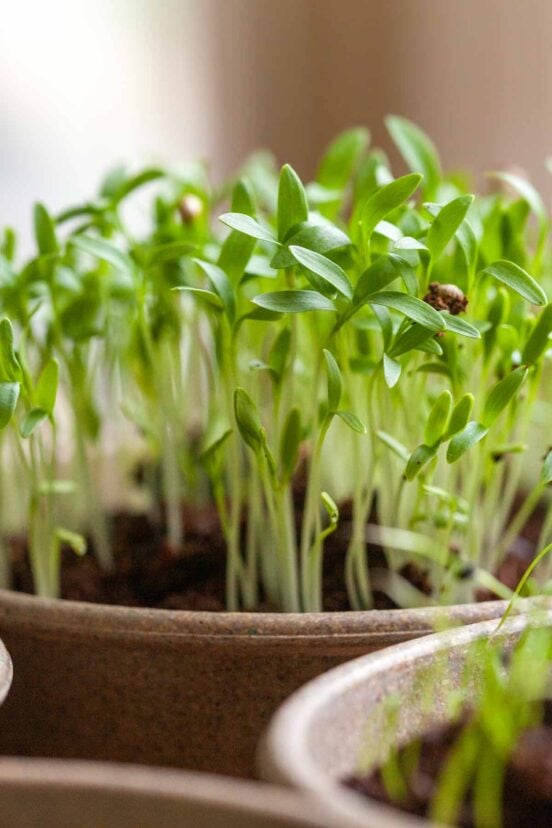
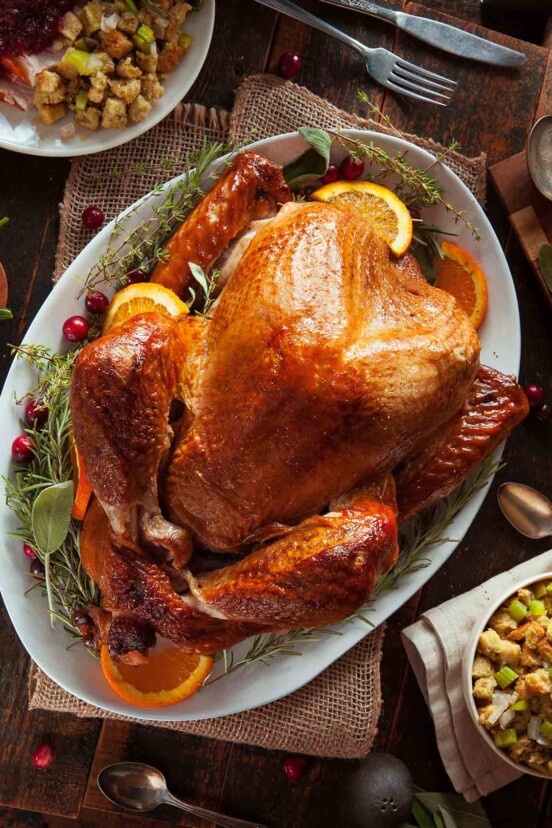









A really beautiful tribute to your Mom, David. And, a great reminder that when we cook intuitively, with our own senses for time and quantity, we learn so much more.
Thank, nakedbeet. Look like Momma Leite’s becoming a (well-deserved) star here. Imagine: being upstaged by your own mother!!
Hi nakedbeet, I’m not on David’s payroll, so he gave me a spot on his website! Seriously, his tribute is touching. Keep cooking intuitively and learning—–the only way I know! Momma Leite
Lovely piece. This is why I appreciate my mother-in-law so much. The woman makes *everything* from scratch, deliciously. (She also, BTW, irons underwear etc., like your mum). And when I ask her for recipes, she’ll show me, and meanwhile describe her every addition in approximate cup and tablespoon measures. She’s a born recipe-developer. What a woman!
Thanks, Jacqui. Your mom-in-law sounds great. Big question: Do you iron your husband’s underwear?!
No! I don’t own an iron OR an ironing board. I aspire to emulate her in the kitchen (and maybe also her warm personality)… but that’s as far as it goes 🙂
Hi Jacqui,
The ironing of the underwear is something David will haunt me until God calls me home! Imagine your kid telling the world! Hee hee. I still do it—neat kitchen and neat underwear draw!
What a wonderful story David, thank you for sharing the spirit of your mother with us all.
Thanks, Elise, it means so much coming from you.
Hello Elise,
We’re glad you enjoyed David’s story. It’s all true, trust me! Each time we read it, we laugh out loud! Momma Leite